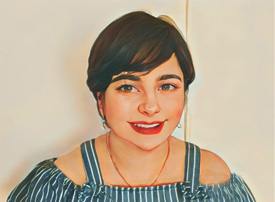By Andrea Garcia-Perez
 As I was staring at the ceiling, I kept closing my eyes, shaking my head, and praying over and over. I kept having this thought in my head, “my brother will fall from his crib and break his arm, my brother will fall from his crib and break his arm.” I hoped that if I kept praying and shaking my head, this terrible thought would go away. I started to cry when I realized that what I was doing to stop these thoughts was useless.
As I was staring at the ceiling, I kept closing my eyes, shaking my head, and praying over and over. I kept having this thought in my head, “my brother will fall from his crib and break his arm, my brother will fall from his crib and break his arm.” I hoped that if I kept praying and shaking my head, this terrible thought would go away. I started to cry when I realized that what I was doing to stop these thoughts was useless.
My uncle, who was 20 at the time, noticed my distress and asked what was happening. I unwillingly told him my thoughts, to which he responded, “You are crazy! Only evil people have these thoughts. Now go to sleep!” At seven years old, this was my first encounter, but definitely not my last, with Obsessive Compulsive Disorder (OCD).
Growing up Latina, mental illness was (and still is) considered a taboo subject. My family members very rarely talk about their emotional struggles, let alone their mental health. It was seen as a sign of “weakness” if you showed signs of sadness, nervousness, or anguish. As an impressionable girl growing up, I wanted so desperately to show my family and myself that I was not “weak” or “evil,” so I hid my thoughts, as best as I could. I did not tell anyone about my recurring thoughts, no matter how frightening or real they were to me. However, by trying to make these thoughts “go away,” I started to engage in rituals, such as writing in my notebook that “I will not have mean, dangerous, or crazy thoughts” when I thought of something unwanted. I would stay far away from pans, the stove, and matches to make sure I would not start a fire. I would even ask my Mom if she could count the matches for me, to “check” that I did not touch any of them, even though I never did get near them. My continuous checking annoyed my parents, but they just thought I was a weird, quirky kid. My constant asking if they were ok meant that I cared about them, and my avoiding my brother meant I was jealous of him. No one realized I was under a lot of mental and emotional stress when my OCD episodes flared up.
When I was 16, I could not hide my OCD to my family anymore. I was under intense pressure to do well in my Advanced Placement classes, SATs, and college applications. I was upset that my uncle had passed away in a car accident. My thoughts and compulsions worsened to the point that I became severely depressed. My parents finally took notice and decided to take me to a psychiatrist.
I was very scared during my first appointment. I thought the psychiatrist would tell me I was “going crazy,” or that I was actually a terrible person. To my surprise, there was a term for my thoughts and actions! For the first time at 16, I finally learned what was going on with me, I was so relieved! I asked my psychiatrist, “when will my OCD go away?” She responded, “Well, think of OCD like diabetes, it cannot go away, but you can control it.” As a Latina, this is not what I hoped to hear, my OCD was viewed as a “weakness of the mind.” or “an excuse to be lazy” by my parents.
There was one occasion when my mom asked me, “What am I doing wrong? You have everything, we don’t mistreat you, why do you have this disorder?” To this day, I still can’t answer why I have OCD, and honestly, I don’t care anymore. However, It was interesting to me that my mom took blame for my disorder. It never was her fault, or mine, or anyone’s. I just happen to be a woman with OCD!
Through the years I have become more comfortable with my OCD. I feel that OCD has made me more empathetic, patient and understanding of others. It has also helped me reach other people who have anxiety disorders, especially in my Latine community.
Although talking about mental disorders in my community is still challenging, discussing, and raising awareness has become more prevalent. It is great to be part of these discussions in which as a proud Latina, I know a thing or two about what that journey is like.

So sad, but anyone who has looked after a loved one with mental illness or dementia will know how hard it is physically and mentally. One of the hardest things in the world is mourning someone who is still alive. My son was diagnosed with schizophrenia 5years ago, with a series of life-threatening symptoms of hallucinations, delusion, and depression, Even with rigorous therapies, antipsychotic medications, and some controversial alternative treatments the condition didn’t improve. Today, it makes 2years since my son recovered after taking CONSUMMO herbal treatment, he is living a complete, normal, healthy life and has returned to college. I wanted to take the time to encourage you never to give up, It is not my intent to persuade or convince anyone, nor should it be considered a replacement for sound medical advice but rather for you to know there is an optional treatment, completely natural and has no side effects. While everyone’s journey is unique, numerous patients with paranoid schizophrenia are effectively treated and cured with their mode of treatment.